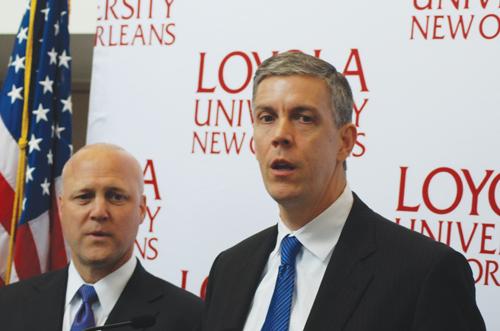Despite the rising unemployment rate, the U.S. government is setting out to show that teachers are still a hot commodity.
On April 8, U.S. Secretary of Education Arne Duncan took the stage in Roussell Hall along with a panel of athletes, experts and educators to promote the Teacher Education Assistance for College and Higher education campaign.
TEACH is a nationwide movement to raise the number of college graduates in the U.S. by increasing the number of teachers.
For marketing senior Sarah Cooper, who is beginnning Teach for America in June, teaching is more than just a profession, it’s a calling. “I felt as if I had a sense of purpose in education,” Cooper said.
Duncan called upon students from all fields to join the profession, not just those specifically studying education.
“We need more great schools of education; we need more great pathways, non-traditional pathways, alternative pathways,” Duncan said. “At the end of the day, it doesn’t matter where the talent comes from.”
Students like Cooper fall into this category. Though she is studying marketing, she lost interest in taking on a job in the field after volunteering with the Ignacio volunteers.
“I started to realize that I didn’t find any fulfillment in jobs that I was looking into in the business field,” Cooper said. “That’s when I started to hear from a recruiter from Teach for America, and that’s when I started to look into business education.”
President Barack Obama has set a goal to have the most college graduates of any country by 2020, and in order to reach this goal, the U.S. government is campaigning to recruit 200,000 teachers a year, totaling 1.7 million teachers.
The state of Louisiana has become a focal point for this campaign by keeping track of its teachers and working to improve the methods by which it trains them.
“Louisiana is the only state that I know of that is tracking its teachers back to their schools of education ,and tracking their students’ achievement and making real-time changes in curriculum, whether it be an alternative certification program or a traditional school of education.” Duncan said. “Louisiana doesn’t have some patent on some fantastic technology, they just have the courage to have these open-arms conversations.”
Loyola is looking into these alternative options.
According to Ed Kvet, provost and vice president for Academic Affairs, the joint Committee to Review the Consequences of Pathways, established by the University Senate and the Standing Council for Academic Planning, issued a report with a number of recommendations, including the suggestion to start a teaching certification program at Loyola.
The report was presented to the Standing Council for Academic Planning on April 12 and the University Senate on April 14.
“I did not look into it as much until I started really looking into my own future,” Cooper said. “Personally, I don’t think I would’ve gone into it, but I think this is the appropriate route for me.”
Sam Winstrom can be reached at
sdwinstr@loyno.edu








